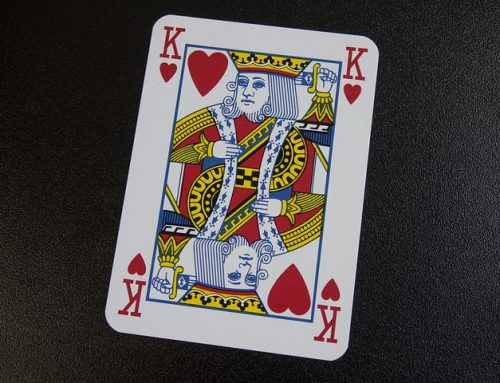I want to start today off with a bedtime story. For the next few minutes Uncle Jack is going to tell you a story so just sit back and relax, but don’t fall asleep. You won’t want to miss the ending:
ONCE THERE WAS A YOUNG GIRL whose parents took her to the Shrine of the Golden Arches. There she saw an opportunity to buy a combination of food and a little toy that someone, in a fit of marketing genius, named the Happy Meal. “May I have it, please?” she asked her parents. “I must have it. I don’t think I could live without it.” “No,” her parents told her. “The toy is a trivial little thing that just enabled the price of this package to be raised beyond what it is really worth. It’s not in the budget. We can’t do it.” But you don’t understand, she thought. She knew that they would not just be buying fries, McNuggets, and a plastic Angry Birds toy, they would be buying happiness. She was convinced that she had a little McVacuum at the core of her soul: “Our hearts are restless until they find their rest in a Happy Meal.”
So she explained to her parents, “I want that Happy Meal more than I’ve ever wanted anything before. And if I get it, I’ll never ask for anything again—ever. No more complaining. No more demanding. If you get me that Happy Meal, I’ll be content for the rest of my life.” This seemed like a pretty good deal to her parents, so they bought it.
And…
it worked! She grew up to be a content, grateful, joyful woman. She lived with serenity and grace. Her life in many ways was hard: the man she married turned out to be a louse, and he abandoned her with three small children and no money. The kids too were a disappointment: they dropped out of school, sponged off her meager resources, and eventually left without a trace. When she was an old woman Social Security gave out, and she had to live from hand to mouth. But she never complained. After all, she had gotten the Happy Meal. She would think of it often: I remember that Happy Meal, she’d say to herself. What great joy I found there. Just as she had predicted, it brought her lasting satisfaction. She was grateful the rest of her life.
[bctt tweet=” She was convinced that she had a little McVacuum at the core of her soul. Curious?” username=”canyon_springs”]
Parents, let me ask you a question. Do happy meals work like that? How long does happy meal happy last? A half hour? 15 minutes? Usually it’s five minutes or until the toy breaks, whichever comes first. You would think that after a while, children would catch on, that they would say, “You know, a Happy Meal never brings lasting happiness; I’m not going to get fooled into it this time.” But it doesn’t happen. When the excitement wears off, all they want is a new fix, another Happy Meal. So we keep buying them, and they keep NOT working. In fact, the only one Happy Meals bring happiness to is McDonald’s. Ever wonder why Ronald McDonald wears that grin all the time? Billions of Happy Meals sold.
Of course, only a child would be so naive. Only a child could be foolish enough to believe that a change in circumstance could bring lasting contentment. Or maybe not. Maybe when you get older, you don’t necessarily get any smarter; your Happy Meals just get more expensive. Instead of a happy meal, we need this. An extra value meal. These don’t come with a toy, they come with extra value. More fries, a bigger burger, a large drink. They should also come with cholesterol medicine. Here’s your value meal. It comes with a Big Mac, large fries, large Coke and your simvistatin.
Somehow as we age, we don’t just need toys. We need value. More value. Extra value. It’s not that we stop looking for toys. We still like toys. We just ask them to do more. We ask them to give us value. If I drive this car and my friends see me, it will give me value. If I have this home in this part of San Diego, I’ll have value. When I remodel my kitchen, then I will have value. As we grow up we need more than just a happy meal toy. We need extra value.
We look for value in other places as well. If I get this job I’ll have value. If I get that promotion, I’ll have value. If I make 6 figures I’ll have value. If I am part of that group of people I will have value. If I’m on this planning committee or this commission or that board, I’ll have value. Once again, extra value.
We all want to raise our value. To feel valuable. To feel useful, successful, important. So we look to clothes or money or fitness or work or cars. We are still looking for happy meal toys; they are just more expensive.
What if I told you there was another way to raise your value? What if I told you that there is a way to find value that wasn’t fleeting? Would you be interested?
If you’ve been reading this blog, you know that last week I started talking about joy and how we can get more of it in our lives. Next week I’m going to continue talking about joy and what the Bible, specifically the book of Philippians, has to say about where we can find it. When I read this story by John Outberg I thought I would share it to you as it perfectly captures the difficulty we have with finding lasting joy in today’s Happy Meal world.
Here are a couple of parting statements about joy and value in our society that are worth considering:
1) Our joy is dependent on how much we feel valued;
2) Our value is dependent on other people.
If you combine these two statements in using classic syllogism (remember that college rhetoric class? If not, look it up), then:
3) Our joy is dependent on other people.
Would you agree that all of those statements are true? If so, do you think your joy is dependent on those around you? Do you think the same statements would apply to Biblical times? If so, do you think Paul when writing his letter to the Philippians would agree that our joy should be dependent on our parents, or our spouse, or our boss? These are the questions I plan on answering in my next two post so stay tuned because I think the answers will surprise you.









Leave A Comment